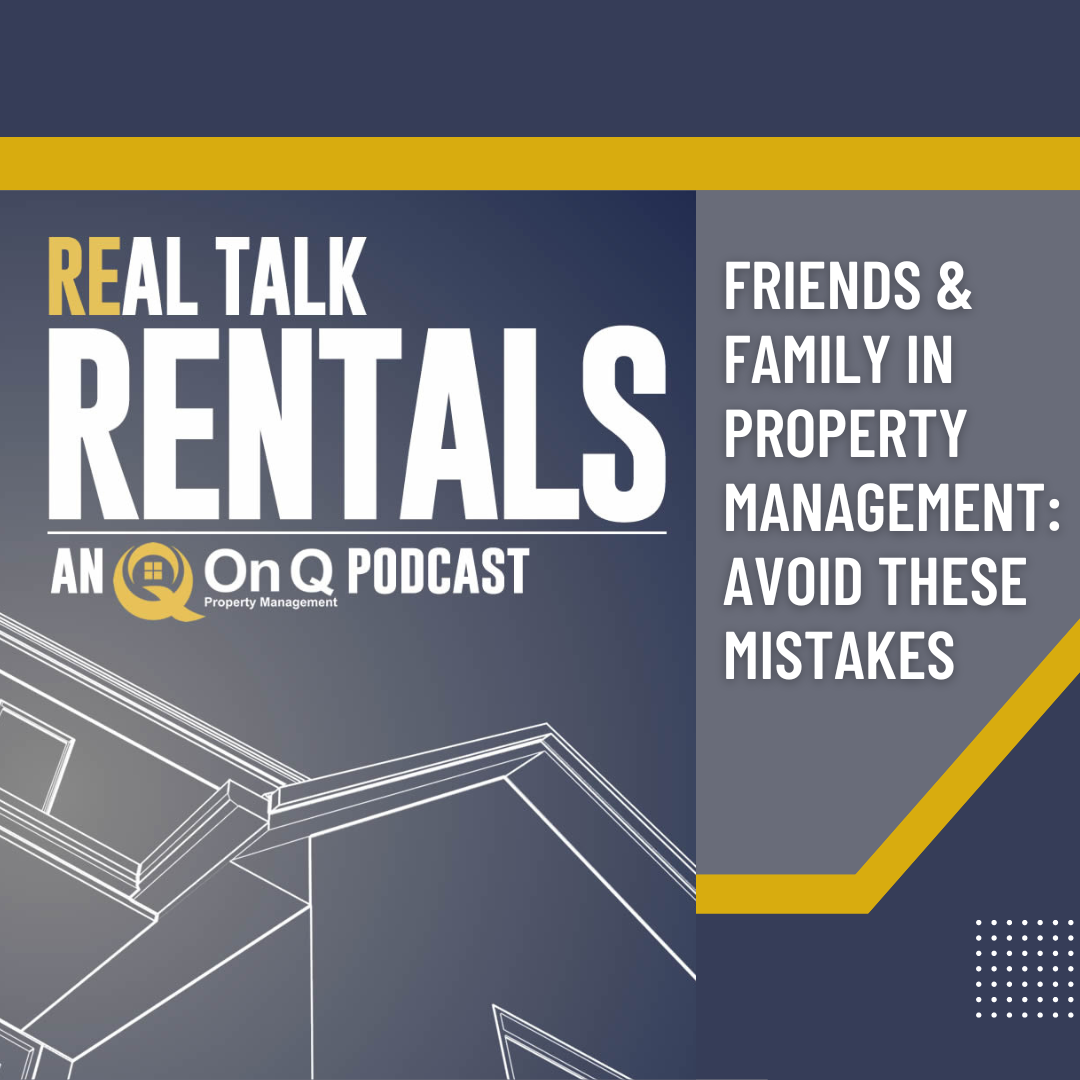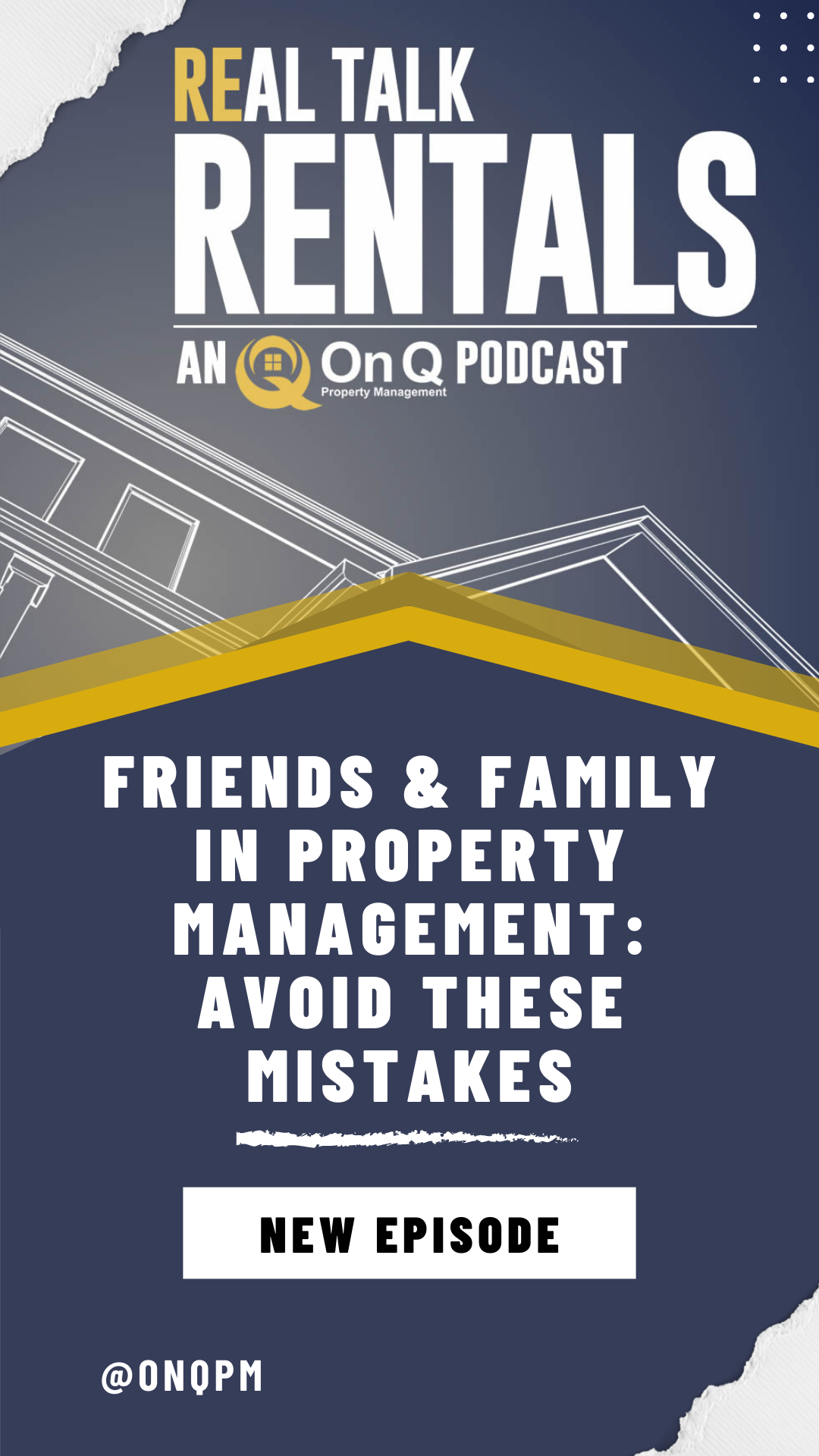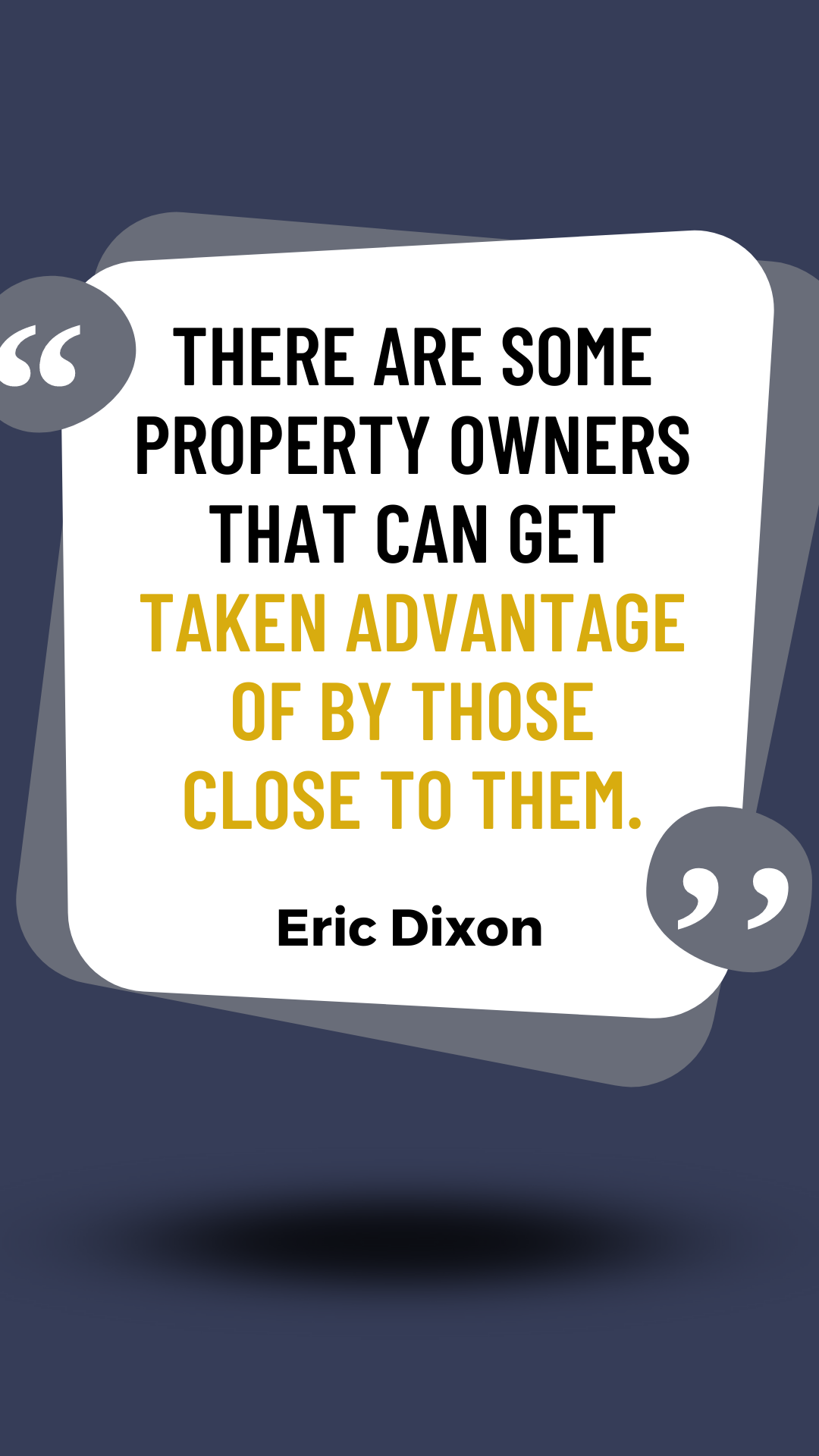REAL TALK RENTALS
Episode 26: Friends & Family in Property Management: Avoid These Mistakes
Are you a property manager struggling to manage your friends and family who are tenants? Or trying to help them out by providing them a job? In this episode of Real Talk Rentals, Ben and Eric take on the challenges of dealing with friends and family in property management. Learn how to solve problems and make the most out of the good times when it comes to working with close ones on rental properties. Tune into this episode for tips from two experienced property managers!
In this episode:
- Pitfalls of working with family
- Renting to loved ones
- Rent Concessions
- Benefits of an impartial 3rd party
Friends & Family in Property Management: Avoid These Mistakes
Ben Bailey: Coming up on today's episode of Real Talk Rentals, we're going to talk about friends and family, specifically the issues and dealing with them in property management. Welcome back to Real Talk Rentals, a podcast brought to you by Oncue Property Management. We're here to give you all the tips and tricks that go into owning a rental property. My name is Ben. With me, as always, Mr. Eric Dixon. Go to expert on all things rental property and real estate. That's just how I refer to you now at all times when I talk, because I say it every week. So now when I talk to my wife, I'm like, Yeah, you know, Eric Dixon, the go to expert. Yeah, it feels so good. This episode, we're going to talk about something that comes up a lot actually, in what we do in one way or another, and that's friends and family. I realize now that I titled this episode, Friends and Family Issues, and it sounds like I'm like mad at my parents or something. But what we're actually talking about is there's so many different steps, so many different people that can be involved when it comes to renting a property. And a lot of people, for obvious reasons, use friends and family. And we're going to kind of walk through the pitfalls and the advantages and everything about that that we see on our end. So, Eric, let's start I'm going to kick it to you. This is probably the most common way that we see friends and family interacting when it comes to rental properties, and that is somebody rents out their property to a brother or a sister or a cousin, whoever. We have somebody here who rents to their father, you know. So this, this happens a lot. Um, what are the pitfalls of this?
Eric Dixon: Well, the yeah, so this is funny because there's, there's so many ways the friends and family could get involved. Could be your property manager, could be somebody you rent it to, could be the handyman, could be whatever. And it's just there's the dynamic, right? That it can go south fast or it can be great. So. Right. Kind of a pros and cons, right? I would say the pros are the things that are great is that you've got this relationship. So you would think you've got trust. You've got, Hey, I know this person. They would never do anything bad, you know, and and you want to help them out 100%. So if you want to rent out to it's like I've known Ben for five years, hey, you'd be a great tenant. But it's just there's this gray area that happens, you know, over time that that you have to get through. I'd say another pro would be payment. Um, I'm just going to use the example Ben's renting from me. It's like, Hey, Ben, uh, cash only, you know, under the table. You could do Zelle or Venmo or Hey, usually are going to get my rent on the first from you. Yeah, and I'm going to put it in my bank account on the first, you know? So payment is going to be a little bit delayed if you have a third party property manager. Sure. Because it's got to clear the account, then they have to send you funds and it could take a week or whatever. Um, and then the other pro potentially these are the great things, right, is there's no middleman. So it's direct contact, right. Um, but as I was thinking about this yesterday, like, hey, this is going to be the topic, I'm like, those are also the cons, right?
Ben Bailey: Right. Yeah. The same list.
Eric Dixon: The same list. You've got relationship. Yeah. It's. You have a relationship, so that could be bad. You've got payment. Could be bad if they don't pay you, then it's like, Dude, this is awkward, man. Why'd you make this awkward? Yeah. Um, and then the no middleman Could be a con. Could be bad because there isn't somebody that is separating the relationship. So I'd say the good and the bad. Just like anything else, it could work out great. And you're like, I don't know why you'd ever hire a property manager or I don't know why you'd, you know, rent to somebody random, just throw it on your Facebook page and rent it to somebody you know? Yeah, it could go great. So it.
Ben Bailey: Could.
Eric Dixon: But it could be bad. So you mentioned so we have an employee that rents to their father. We've got another employee who rents to a former employee. Yeah. We've got a current employee that rents. To a current employee. Yeah, I forgot about that one until just now. So we have that one. Um, but we also have an owner. I signed him up years ago. Hired us to evict their son. Yeah, we've had, uh, we've had divorce issues. You know, we've had, you know, a husband rents to their ex-wife and now wants her gone. You know, you've got crazy dynamics, and at the end of the day, they hire us to get in the middle of it. And then as soon as that's done, they're like, Hey, let's rent it to somebody on the open market. Sure, I'm done with the relationship part of it. Yeah.
Ben Bailey: We feel like we're always talking about in this podcast is you got to take the emotion out of it, right? Treat it like an investment. Take the emotion. If you know the person, it's impossible, right? The emotion is going to be there. And obviously to us, that's a bad idea. It may work out great in some situations. I know tons of people it does. But they're the emotions are always going to be there. And kind of give you the example yesterday when we were chatting about this that like, if I owe $500 on a bill, I'm going to pay that bill on the due date. You know, if I owe my parents $500, I might be like, Yeah, I'll get them the next paycheck. You know, no big deal. Like mom and dad, they don't care. And it's not even a malicious thing. It's just when there's that, I know them. I know their financial situation. They're fine. You know, like, I can get it.
Eric Dixon: To the first of the 10th. It's all.
Ben Bailey: It's. Yeah, they'll get it. They know I'm good for it, so it's fine. But you wouldn't do that, you know, if I'm. I wouldn't do that with my current landlord. She knows I'm good for it. I'll get it to her when I get it to her, you know, because it's not that same relationship, you know, it's a business relationship.
Eric Dixon: And to your point, so the good and the bad, there's two different columns. It's like emotionally and stress and all that, but it's also financially. Most of the time what we see at least is when you do rent to a family member, a friend, somebody you know, someone who knows somebody, you also give them a deal. And so it's like double whammy. It's like, Dude, this is stressful and emotional and man, this is hard. And and I rent it for 20% below market rate, you know? Yeah. And it'd be one thing if it's like, hey, I rent to friends and family, but it's market rate. At least you're getting market rate, right. Yeah. But usually I've seen it hundreds of times, literally where month after month after month, you know, you're giving them a deal, giving them a deal. And then the tenant also expects you to provide all these other things. There's just so much gray area. I mean, my advice is if you're in the middle of that now, just just commit now to going on the open market next time, whether it's through a management company like us or by yourself, like just go on the open market, you'll get market rate and then you'll have that buffer, you know, between.
Ben Bailey: All right, So next most common situation that we see is maintenance. And that is like, you know, hey, the property's got a leak, my brother's a plumber or my brother's not even a plumber. My brother's really handy. You know, he's not a certified plumber.
Eric Dixon: A certified plumber. Yeah, that's.
Ben Bailey: Totally that's totally different. But it's like, hey, you know, he knows how to fix this stuff. I'm going to send him over there. Why is that obviously a bad idea?
Eric Dixon: Yeah. Yeah. Mean number one rule with maintenance without that scenario is always use a licensed insured contractor. So to your point, you know, if my brother is a plumber, he's licensed and everything, it's like, Hey, sweet, he'll probably actually give me a deal. And he's licensed. That's fine. But, you know, our requirements are licensed and insured. They've got to provide a W-9. They've got to provide a certification of insurance, their licensing as a bare minimum to touch the property. Right. And we've had example over example of how that's helped and saved the owner and saved the property because of issues. But the number two rule right behind that one is if you're not using or do not use that, you know, Craigslist wonder or that referral from somebody from somebody that's just like, oh, he's super handy. He's the best. It's only 50 bucks or 100 bucks and they'll do it. Yeah. And you don't even say, are you licensed, Are you, are you insured? You know, just don't use that guy. Like, yeah, sure.
Ben Bailey: You get what you pay for usually.
Eric Dixon: Yeah. And whether it's, you know, month to month to get what you pay for or if it's down the road.
Ben Bailey: Yeah. Might come up later and bite you. Um. I would say, too, like even outside of this industry and what we've seen here. You know, I would be hesitant to use even if my brother is a licensed plumber because things happen. Right. And you don't want to bring in, like a bad blood where it's like you both feel like you're not at fault. But it's like, Hey, man, you screwed me out of $10,000 because the place flooded, you know, And maybe it wasn't his fault, but you don't need to bring that into a relationship. You know, it's.
Eric Dixon: Super tough, man. The. And then aside from that, even if they're great, it just makes it awkward. It's like, Hey, man, this is my investment. You fix the plumbing, but like, it's still broken. Yeah. Can you go back and fix it? It's under warranty and it's like, All right, Ben, now you're taking advantage of me. Yeah. And it's like, No, no, I would do this with any plumber. Yeah, exactly. Hold them to their warranty terms, you know? Yeah. Um, the other. The other reason I just thought of is the, you know, the legitimacy of the contractor is important for invoicing and your expenses for when you do taxes and for when you're tracking things super tough to track, giving somebody 50 bucks on the side to pay an unlicensed vendor versus paying somebody on a legit invoice. It has their license number on the invoice. If you ever got audited by the IRS or whatever, you're like, No, this is a legit plumbing invoice and know that you're paying somebody by Zelle or Venmo is like, Yeah, it's just a bootleg way to do it. You'll save a few bucks. But in the long scheme of things, it's not worth it.
Ben Bailey: Yeah, you'll you'll cover yourself too, by using that insured, you know, licensed contractor. I remember I worked in restaurants for a long time and we would build new restaurants and you would always see these like mom and pop places that would build up and. You wouldn't even think about it. But in the restrooms and bathrooms, they have the diaper changing thing, right? No contractor will touch it. There are special licensed people that put that in because they're like, I'm not going to be the guy that bolts that to a wall and then it falls with a baby on it.
Eric Dixon: Exactly.
Ben Bailey: So you literally have to hire a special guy. That's all they do. Oh, that's super. And they you know, they're covered for that, like so we've seen all sorts of stuff here. We've seen, you know, with a contractor, a technician we don't use anymore. But a place burned down.
Eric Dixon: Oh, yeah. No, I was going to say that example is still in my mind because it was only like a year ago, but it's like it was a legit licensed, bonded, insured contractor technicians. Very professional. Freak accident. Yeah. With soldering a shower, I think, or doing something in the bathroom and it caught the insulation on fire, burned the four plex down. Yeah. So you've got four units uninhabitable. But they were licensed, bonded, insured. Opened a claim tenant's got, you know, it ended up being fine.
Ben Bailey: Yeah. Just an.
Eric Dixon: Insurance accident. But can you imagine if the owner hired a bootleg handyman and they burn the place down?
Ben Bailey: He's like, That's my brother. He just had a blowtorch, so asked him to do it. You know, he scorpion hunts with that thing. So said, Bring it over and fix the shower. No, but.
Eric Dixon: It's just like, Dude, that's a freak accident. And if that guy wasn't licensed, yeah, he'd say, Sorry, but it's the property owner that's like, Oh dang. Like, not only does he not have insurance, my insurance may not cover it because I didn't hire a licensed contractor. Right? So, you know, that could be bad. We've had, um, we had a flood that a flooring contractor that we used unhooked the washer dryer, replaced the flooring. Oh, yeah. And the next day we came back and there's two inches of water everywhere, and they incorrectly unhooked the water and didn't check and it pressurized and something happened and, um, they had insurance and it was a licensed, bonded, insured subcontractor and they covered it and we moved on and the owner was really cool about it. He's like, Well, as long as I get my lost rents, like I don't care. Yeah. And I get new flooring and new baseboards and new paint and he's like, This is actually kind of cool. Yeah. So, hey, thanks for using a legitimate contractor.
Ben Bailey: Yeah. Yeah. All right. Um. Next scenario. Let's say I own a couple rental properties. I'm busy, but I know my sister is not. She's at home. She's chilling. I say, Hey, why don't you manage these for me? You know, why don't you run these? And this sounds absurd, but we see it. We see people. We have a guy whose mother in law managed a bunch of properties for him.
Eric Dixon: We're just saying that. So the one you're talking about. Yeah, just signed him on and they've been self-managing for years and it's just like, no, my mother in law needs to stop managing my properties.
Ben Bailey: Yeah, and we're talking double digit, not 1 or 2. You know, this guy's got a lot of properties and it's to save.
Eric Dixon: I don't know as far as the whole portfolio is concerned. Pennies man. Yeah. I mean, as a percentage of gross rent, you're like you are losing out on, you know, so many things. But I ask myself the same thing. It's like it's not a licensed insured contractor, but is your sister a licensed? Like in Arizona, you have to be a licensed real estate agent or a licensed brokerage to do property management. So are they licensed? Do they have the credentials? Do they have the the insurance, the errors and omissions insurance in case she screws up? Like, is she going to cover it? No, she's going to say, hey, sorry, brother, you know, I'm not a legit manager. Like, I don't know what you want me to do. Yeah, I'll go. Well, I'm so glad I saved the 20 bucks a month. Yeah. Difference, right? Like the. There was one specific that owner that was paying a family member to do it. Very similar to how much they pay us now to manage it. And it's like you're talking about tens of dollars a month saved per property. And is the difference between a sibling doing it to kind of help them out versus a professional property manager? So I mean, I would just say same thing as the contractor. Just make sure they're licensed and your relationship with that person, I have to think is worth more than saving a few bucks. Absolutely no. And if you're trying to help them out, help them find a job. Yeah. You know, don't don't don't make them your property manager.
Ben Bailey: Or, you know, if they work for a property management company, there's there's nothing wrong with that. But I would think to me, you know, I would say if my brother came to me and say, yeah, for sure, I'm going to have Eric manage your property, who I work with, you will talk to him about this. You and I are never going to talk about this, but we'll take care of you. You know, we'll. We'll. We'll set you up. You'll be in good hands. Because. Why? Why bring that in? You know? Could you mean get along with my mother in law? And the idea of her managing anything for me is terrifying. Yeah, it's.
Eric Dixon: Terrifying. And it's mostly because you don't. You don't want that to come between you. Yeah, absolutely. Any repair or issue. And you're like, Dude, now it's awkward. This is. Yeah, don't make it weird, man. So.
Ben Bailey: Um, I have a good friend. This is another kind of horror story, but he recently moved and bought a new house, decided to keep his current house. He lives on the same street as me. So he was keeping that house on the street and renting it out. Met with On-q, met with some property managers. Then all of a sudden a buddy of his was like.
Eric Dixon: Oh, the guy that. Yeah, he ended up not signing up. Yeah, he.
Ben Bailey: Didn't sign with us, you know, No hard feelings, whatever. And he's got I got a friend who's just going to move in. He needs a place. And I was like, I don't know if you should do that, man, but okay, So the other day I come home. This was like a week ago. And the garage door, the front garage door. I mean, it looks like the guy ran into it with the car like it is completely. Which probably would happen completely dented in into it. Yeah. So I text my buddy like, hey, I don't know if you know this, but your garage door has been hammered, you know, it's destroyed. He's like, What? Are you kidding me? Yeah. Guy didn't tell him. Comes down, looks at it. He's, you know, hemming and hawing. And then he came over and talked to me and says, Yeah, you know, he doesn't have the cash right now, but when he does, he's going to fix it. And it's like.
Eric Dixon: You know how that's going to play out.
Ben Bailey: Yeah, like you wouldn't, you wouldn't in a normal transaction situation, make that exception. If somebody drove through a part of your house, you would be like, Man, you got to fix that and fix it now, you know?
Eric Dixon: Yeah. And then like and we have that right where that exact scenario, if it was through a management company, maybe the neighbor doesn't call us, but the HOA is going to hit us up. The owner is going to get a violation. Hey, your garage door is messed up. Then we get to the tenant. We'll we we enforce the lease, whereas him did the. Unfortunately, the tenant is like puppeteering the tenancy, the owner's emotion. Yeah. You know, like, Hey, sorry, I don't have the money right now, man. I promise I'm good for it. And yeah, probably giving him a deal on rent for sure. Yes.
Ben Bailey: 100%.
Eric Dixon: It's just like, Oh, dude, you feel for those owners, man. They're getting taken advantage on the financial part. And now again, financially on the on the garage door.
Ben Bailey: And he's just a good guy and no would never, you know, he's the kind of guy that'll just grin and bear it. It's like, man, I just want to be like, Come here. Just sign up. You know, just you're not saving that much.
Eric Dixon: It sounds like we've got him next time for sure.
Ben Bailey: Yeah, for sure. Right. We'll remind him. All right. So last scenario I wanted to touch on and this one obviously you know a lot about and I would think can be a very positive experience. And that's using for buying and purchasing real estate, you know, using friends or family. Whether that's investment properties or just real estate in general. Is that do you think there's downsides to that?
Eric Dixon: Yeah. So I'd say yes and no. Like, like in all things like and I have to think of all of the friends and family who have used me. So it's like, sure, using friends and family is great. Yeah. You know, but, but it would be the caution is, especially as you're investing in rental properties, is just making sure that the agent that you're using, if you're related to them or their friends and family or whatever, that's totally fine. They can earn that commission, they can do that, but make sure they understand what buying an investment is versus buying like your primary residence. Yeah. And both of them, it's a real estate transaction. I get it. But there is more that goes into it and it's not very complicated, but it's, you know, we see it all of the time, especially with right now in Arizona. There's new builds going up everywhere. Yeah. And we get these owners that are like signing up with our service, have this brand new property. I'm excited to rent it out. They sign up and then we talk about comps, you know, rental comps, the comparables of what you're market rate is going to be. And they're like, Yeah, we'd like to start at 3000 a month. And we're like, Oh, well, here are the rental comparables. And it's actually like 23, 2400. Yeah. And they're like, No, no, no, no. My real estate agent said you could for sure get 3000. Yeah. And I'm like, Your real estate agent has no idea what the crap they're talking about.
Ben Bailey: Yeah, because they don't do it every day.
Eric Dixon: They don't do it. And it's not. It was not malicious, I'm sure. Sure. They probably threw it up in Zillow rent estimate was this or. Yeah, they kind of said yeah, yeah. My friend rents a house around the corner with that, but they don't realize that their friend's house has a pool and five bedrooms instead of three or whatever. Right? And agents are not malicious about it. They're just excited and they're getting a deal done and they're, yeah, they're trying to get pen to paper and get that commission, you know, But just make sure that if your agent's not doing it for you, there are agents that do. I feel like we do a great job at it, but let's say you still want to use your friend, at least determine the rental rate and all that stuff before you you were fully committed. Sure. Get with the property manager, say, Hey, I'm buying this house. What is this going to rent for? There's a lot of heartache will be avoided, you know. Yeah we we have some that say, you know that example I was giving you, they start at 3000 and we lowered 100 bucks. 100 bucks lower to 100. And it finally rents out at what we told them it would at 25 or whatever. Sure. And then they're like, Man, I'm upside down on my mortgage payment that I thought I was going to be making 500. I'm upside down. 100. Yeah. And I would have never bought this place or whatever. And then and then it creates this animosity and stuff. So I would just say investing in a rental property is a little bit different than your taking your family around looking for your primary residence 100%, you know, looking for your primary residence. It's an emotional decision. Sure, it's financial, but a lot of it's emotion. It's school district. It's how close you are to your parents, your work, your friends. When it's an investment as a rental, you do look at school districts, you look at crime, you look at a couple things, but it's less about that and more about return on investment long term appreciation.
Ben Bailey: It's a numbers game. Yeah, a numbers game.
Eric Dixon: And so you need your agent needs to understand the numbers game. Yeah, that's a great way to put it.
Ben Bailey: You told me this yesterday and it blew my mind, but that, you know, we'll have people that are owners with us and they'll call and they'll say, Hey, my, I'm going to buy this property. My real estate agent. Can you just want you guys to run comps and send them over to them? And it's like, no, hang on. Like that's what he should be doing.
Eric Dixon: Or she Hey, the licensed agent that's helping me on the buy doesn't know how. So can I ask you the licensed agent to run my rental for me? You know, and we're happy to do it. Sometimes it gets out of hand. We'll get a list. Hey, these seven houses we looked at today, can you tell me the best deal? And it's like, Hey, look, we're not representing you on the buy, right? So, you know, it is touchy and we don't want to step on toes. Dude. The licensed agent community here in Arizona is fantastic. They're supportive of property managers. You know, it would never speak ill of them. Yeah, but they need to either learn how to do that or get out of the rental investment game, you know, and just focus on the on the primary residence stuff. But they're great and it's not that complicated. It's just as the investor you guys listening make sure you know those numbers going into it and so it's not a surprise, you know, when you're going to put it for rent and you're like, Man, I'm out of the range. I'm out of the ballpark, but I've already bought the property.
Ben Bailey: Yeah, yeah. And we see that. And it's like you said, they end up being upside down and it's like, Man, what a bummer, you know? Okay, um, hopefully we haven't turned people off too much from. Hey, friends and family.
Eric Dixon: Friends and family are great. They're great. I feel like I feel like we're kind of counselors right now. Like, stay away from friends and family, you know?
Ben Bailey: Yeah, but, you know, this is all these examples are real world examples that we see here, you know, all the time. And it's like and.
Eric Dixon: I'm guilty of it even right now, like right now of rentals, right? I have fantastic I have a couple tenants that are personal friends or whatever, and this is not speaking bad. Out of that. It's just like, no, there there are potential issues. There's this gray area of like, well, do they know they're getting a good deal? I expect certain things. And it's like, that's not fair to either either me or the tenant. Yeah. You know.
Ben Bailey: They show up to the park and you're like, That's a nice new car you got and I'm paying you 500 bucks. You're paying me 500 below market rate, like kind of those kind of things. You don't you don't want to bring those into a friendship. Yeah.
Eric Dixon: No, no. I've been lucky where it hasn't. Hasn't turned into issues. But the bad, bad, bad issues are ones that our company has taken on, and it's like we're evicting family or Yeah, they're hiring. They're hiring us to have the hard conversation. Yeah. And it's like, Well, that's not fair.
Ben Bailey: No, we'll do it. But that's not fair.
Eric Dixon: That's messed up. Yeah.
Ben Bailey: All right. That's it for us this time. Be sure to subscribe to the show wherever you're listening and leave us five stars if you can. It really helps out. And we will see you guys next time.
Our Company
On Q Property Management is a full-service Property Management company specializing in managing residential rental properties. On Q's client-first approach - utilizing a proprietary process and set of tools - delivers a more transparent and profitable property management experience. With year-long tenant guarantees and a no-fee cancelation policy, On Q is dedicated to earning you business month after month.
Arizona Designated Broker: Eric Dixon
Texas Designated Broker: Rodney Henson
Texas Real Estate Commission Information About Brokerage Services
Texas Real Estate Commission Consumer Protection Notice











